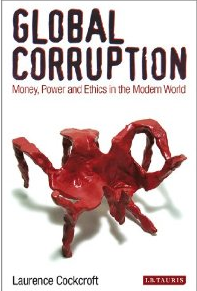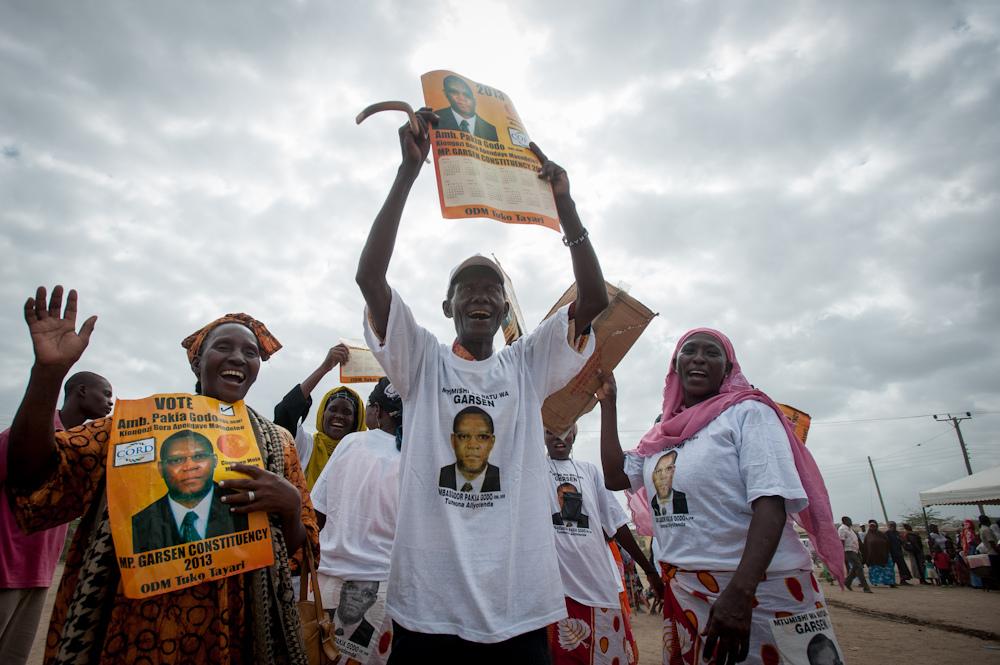Corruption: a global problem or an African cancer? – By Laurence Cockcroft
 Is African corruption unique, or is it just like corruption in the many other parts of the world? Citizens of African countries tend to argue that they have an unchallengeable lead in the whole business of corruption – their own problem exceeds that of all other countries. International corporate types, however, tend to see corruption in Africa as being no different to that which they face or participate in across a range of countries. In NGO circles corruption in Africa tends to be regarded as a product of western influence and the siren voices of capitalism. Where does the truth lie?
Is African corruption unique, or is it just like corruption in the many other parts of the world? Citizens of African countries tend to argue that they have an unchallengeable lead in the whole business of corruption – their own problem exceeds that of all other countries. International corporate types, however, tend to see corruption in Africa as being no different to that which they face or participate in across a range of countries. In NGO circles corruption in Africa tends to be regarded as a product of western influence and the siren voices of capitalism. Where does the truth lie?
In my book, Global Corruption : Money, Power and Ethics in the Modern World, I explore the nature of corruption across the world, the forces which drive it forward, and the roadblocks to combating it. Many of the issues discussed are common to a range of countries. I particularly focus on five key drivers. The first is the size of the “˜unrecorded economy’ – in many countries from Russia to Nigeria unrecorded transactions amount to at least 40 per cent of GDP, constituting a vast reservoir from which corrupt payments can be made without trace.
The second is the system of “˜political finance,’ by which huge sums of money, often gained corruptly, are invested in the political process with the expectation of a corruptly gained reward once power is secured or re-secured. This is easily discernible in most political systems from the US to India.
The third is the role of organised crime in securing political support and cover for trading operations ranging from drugs to counterfeit pharmaceuticals – a recognised practice from Italy to Thailand.
The fourth is the role of national and international companies in the “˜mis-pricing’ of products which enable a large chunk of profits to be moved to havens where tax is low or non-existent – a common phenomenon from Russia to Peru.
The last is the system by which illegally and corruptly gained products – such as oil, timber and rare minerals – transit from the illegal sector to the legal sector, such as timber from Cambodia or counterfeit drugs in south east Asia.
It is easy to see that these five drivers are also at work across Africa. No African country has an economy, except South Africa, in which more than 60 per cent is recorded in standard GDP figures; dominant political parties are typically funded by a small clique with corporate interests ; organised crime is a major factor in many countries especially in the drugs and counterfeit pharmaceuticals business ; “˜mis-pricing’ of mineral and timber exports is common; and the transit of illegally acquired products – such as timber, oil and coltan – from the informal to the formal sector is widespread. By these criteria, corruption in Africa is very much part of an international pattern.
How does this work out at the country level?
In Zimbabwe, Robert Mugabe has been maintained in power by an elite group with strong ties to the military. This group once extended its tentacles to the DRC and does so now in the domestic diamond mining industry, the output of which goes largely unrecorded. Paul Biya, in power in Cameroun for 30 years, is partly sustained by the export of illegally felled logs from Cameroun’s vast forest reserves. Key politicians in Guinea-Conakry and Guinea-Bissau have become active partners with Colombian drug cartels in the trans-shipment of cocaine to Europe. In Nigeria, oil “˜bunkering’ from the Delta enriches both local and national players in the government and the army – a classic case of illegally acquired products entering the world’s legal trade through the Rotterdam market. The price at which Tanzania’s booming mineral exports – notably gold, platinum and uranium – enter the world market is controversial and secret.
Whilst these types of corruption are common across much of the world, it is difficult to argue that Africa is a victim of global and corrupt processes which, substantially, it cannot control. The question of the size of the unrecorded sector is one which governments can tackle over a three to four year period as, for example, Rwanda has shown. Any increase in the local tax take – a growing theme amongst donors – depends on a steady increase in the relative size of the formal sector. The control of political finance is a big problem throughout the world, but the more outrageous raids in Africa on Treasuries, Central Banks and the defence budget can be dramatically reduced. The expansion of the tentacles of organised crime depends on the compliance of at least some elected and non-elected officials, but the process is not inevitable. The transit of products from the illegal to the legal sector, although a mechanism requiring international collaboration, is ultimately triggered by local rather than international initiative.
The question of mispricing is one for which the responsibility falls much more heavily on the corporate world outside Africa and where African countries are undoubtedly frequent victims of this, losing huge quantities of revenue in the process. Here initiatives such as the Extractive Industries Transparency Initiative (EITI), which commits both companies and governments to reporting the revenue they respectively earn and receive from the exploitation of mineral resources, are key (of the 14 countries which are “˜fully compliant’ with EITI, seven are in sub Saharan Africa).
Africa’s corruption has many global aspects, especially the fact that it arises from deep structural factors which it will take great energy and courage to change. Heroes such as Nuhu Ribadu and John Githongo have shown the way forward, but have also demonstrated the depth of resistance to rolling it back – both were forced into exile. As elsewhere in the world, governments will have to address the underlying issues as well as the symptomatic cases which are only occasionally brought to court.
Laurence Cockcroft is a development economist and former chair of Transparency Internatiional. His book, Global Corruption : Money, Power and Ethics in the Modern World, is published by I.B. Tauris this month.






[…] theme amongst donors – depends on a steady increase in the relative size of the formal sector.  Read more… Share this:ShareTwitterFacebookLike this:LikeBe the first to like this. This entry was posted in […]
Honestly, African Corruption is on decrease mainly due to the awareness of the normal Wananchi, previously the Wananchi were trapped in the darkness of illiteracy, now majority can read and understand what is happening inside their governments.
Great reading, sounds like an interesting book!
I am very pleased to see that the book takes a global perspective and does not resort to the circular argument of blaming corruption on corrupt leaders, but instead has an eye for the complex interplays internationally.
Here, it cannot be stressed enough how damaging the so-called ‘tax havens’ are – not only for mis-pricing as mentioned in the article, but in fact for most types of large scale corruption. Others have argued that the primary characteristic of ‘tax havens’ is not low tax, but secrecy (hence they are often also referred to as ‘secrecy jurisdictions’). Corruption thrives on secrecy, and this is exactly the ‘service’ that places such as Switzerland, Cayman Islands and others offer.
It is one of the great paradoxes in current thinking on corruption that these secrecy jurisdictions tend to rate as the least corrupt on the Transparency International’s influential Corruption Perception Index despite the central role they play in corruption on the global scale.
To begin to tackle corruption – be it in the form of political corruption, corporate corruption or organised crime – we have to tackle these secrecy jurisdictions. I recommend reading this article for more on this perspective: http://www.taxjustice.net/cms/upload/pdf/0701_Mirror_Mirror_corruption.pdf
Corruption and Democracy
http://read-online.org/archives/2817
It is evident that corruption is a global problem and no one is a victim, no not Africa. No illegal logging is being done in Cameroon, it is not a reliable information